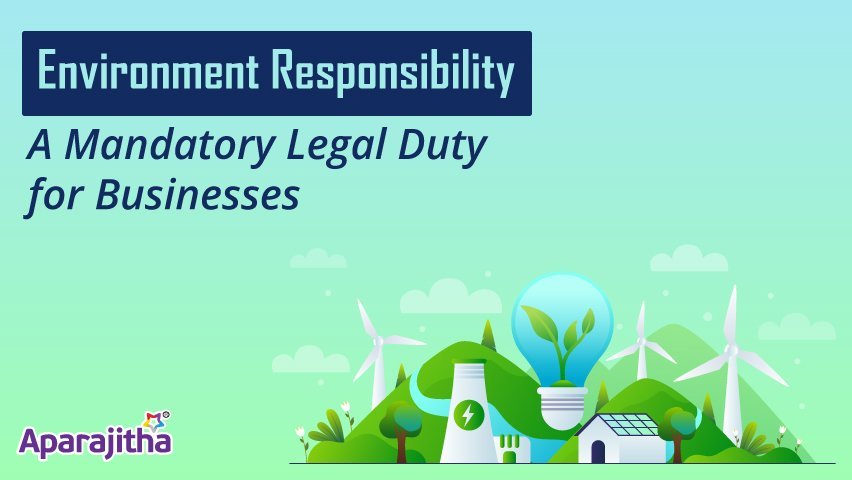Environment Responsibility – A Mandatory Legal Duty for Businesses
Environment Responsibility is no longer just an expectation from regulators but a mandatory legal duty for Corporates. All the Corporates are legally bound to operate in a manner without causing harm to the environment & be more environmentally aware and responsible.
Industrial activities are one of the primary causes of rising pollution, increased risks of environmental accidents, and harmful chemicals in the atmosphere, all of which pose a significant threat to the environment.
So, for ensuring environmental conservation and management, governments all over the world have maintained the principle of environmental responsibility. The government of India as well have passed various acts related to a specific type of pollution such as:
The Environment (Protection) Act (1986): This act gives power to the Central Government to follow certain measures that set standards for the industrial units and give them instructions to improve the environment. This act covers all forms of pollution – air, water, soil, and noise pollution. It also makes sure that safe standards are practiced which prohibit the use of hazardous material.
The Forest (Conservation) Act 1980: The Forest Conservation Act 1980 protects and improves the forest covers. This act curbs all the activities that involve converting the forests into grazing lands, agricultural lands, or residential units.
The Wildlife Protection Act, 1972: The Wildlife Protection Act has been enacted to safeguard and protect the flora and fauna of the country. The Act makes sure that no person can destroy or exploit any wildlife from the National Park that tries damaging the habitat of wild animals.
Water (Prevention and Control of Pollution) Act, 1974: This Act aims at preventing water contamination. It focuses on enhancing and restoring the water for the establishment of boards so that proper usage of water can be done. It focuses on establishing state water testing laboratories and developing protocols.
Air (Prevention and Control of Pollution) Act, 1981: The Act directs the Central Board to improve the quality of air and control air pollution. It has to collect, compile and publish statistical and technical data related to air pollution. Whereas, the State Board has to advise the State Government to understand the suitability of any premises, likely to carry out industrial operations and might cause air pollution in near future.
Indian Forest Act 1927: It is one of the important laws passed by the Central Government. The Act focuses on strengthening the forest laws & increasing the productivity of the forest. The Indian Forest Act 1927 amendment is more focused on the conservation of forests and proper utilization of their resources. It concentrates on reducing carbon emission and climate change happening due to growing deforestation and degradation policies.
Organisations that don’t comply with the above regulations can suffer serious legal and financial risks like Criminal Charges, Business Closures, Heavy Penalties, Reputational Damage, etc, which can have a long-term negative impact on the business.
Dr.G.Sridharan
Business Head
Aparajitha Corporate Services Private Ltd
Join our upcoming 60 Minutes Compliance Webinar
As per provisions of the Water (Prevention & Control of Pollution) Act 1974 & the Air (Prevention & Control of Pollution) Act 1981, any industry which is likely to discharge trade effluent, sewage, emission into the environment/atmosphere will have to obtain consent from PCB.
Join us as we discuss how to
- Obtain all the consent applicable for your business from the Pollution Control Board
- Ensure robust EHS compliance processes in the face of increasing regulatory changes
- Adhere to both external & internal EHS Compliance Policies
- Identify & mitigate EHS risks through regular audits and risk assessments
- Avoid financial penalties & business risk associated with EHS Non-compliance
Register Here




